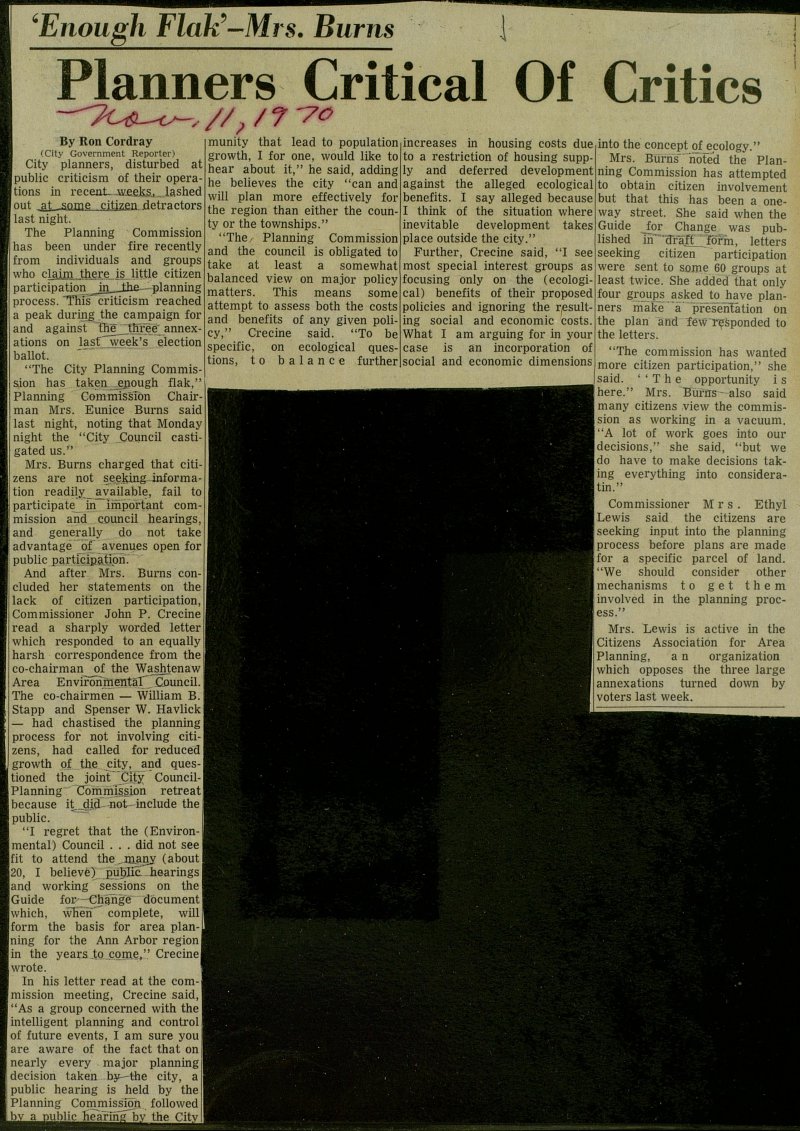Planners Critical Of Critics

City planners, disturbed at public criticism of their operations in recent weeks, lashed out at some citizen detractors last night. The Planning Commission has been under fire recently from individuals and groups who claim there is little citizen planning process. This criticism reached a peak during the campaign for and against The three annexations on last week's election ballot. "The City Planning Commission has taken enough flak," Planning Commission Chairman Mrs. Eunice Burns said last night, noting that Monday night the "City Council castigated us." Mrs. Burns charged that citizens are not seeking information readily available, fail to 1 participate in important commission and council hearings, land generally do not take advantage of avenues open for public participation. And after Mrs. Burns concluded her statements on the lack of citizen participation, Commissioner John P. Crecine read a sharply worded letter which responded to an equally harsh correspondence from the co-chairman of the Washtenaw Area Environment Council. The co-chairmen - William B. Stapp and Spenser W. Havlick - had chastised the planning process for not involving citizens, had called for reduced growth of the city, and questioned the joint "City Planning Commission retreat because it did not include the public. "I regret that the (Environmental) Council . . . did not see fit to attend the many (about 120, I believe) public hearings and working sessions on the Guide for Change document which, when complete, will form the basis for area planning for the Ann Arbor region in the years to come," Crecine wrote. In his letter read at the commission meeting, Crecine said, "As a group concerned with the intelligent planning and control of future events, I am sure you are aware of the fact that on nearly every major planning decision taken by the city, a public hearing is held by the Planning Commission followed by a public hearing by the City munity that lead to population growth, I for one, would like to hear about it," he said, adding he believes the city "can and will plan more effectively for the region than either the county or the townships." "The, Planning Commission and the council is obligated to take at least a somewhat balanced view on major policy matters. This means some attempt to assess both the costs and benefits of any given policy," Crecine said. "To be specific, on ecological questions, to balance further increases in housing costs due to a restriction of housing supply and deferred development against the alleged ecological benefits. I say alleged because I think of the situation where inevitable development takes place outside the city." Further, Crecine said, "I see most special interest groups as focusing only on the (ecological) benefits of their proposed policies and ignoring the resulting social and economic costs. What I am arguing for in your case is an incorporation of social and economic dimensions into the concept of ecology." Mrs. Burns noted the Planning Commission has attempted to obtain citizen involvement but that this has been a one-way street. She said when the Guide for Change was published in draft form, letters seeking citizen participation were sent to some 60 groups at least twice. She added that only four groups asked to have planners make a presentation on the plan and few responded to the letters. "The commission has wanted more citizen participation," she said. ''The opportunity is here." Mrs. Burns also said many citizens view the commission as working in a vacuum. "A lot of work goes into our decisions," she said, "but we do have to make decisions taking everything into consideration." Commissioner Mrs. Ethyl Lewis said the citizens are seeking input into the planning process before plans are made for a specific parcel of land. "We should consider other mechanisms to get them involved in the planning process." Mrs. Lewis is active in the Citizens Association for Area Planning, an organization which opposes the three large annexations turned down by voters last week.
Article
Subjects
Ron Cordray
Washtenaw Area Environmental Council
Guide for Change
Ecology
Citizens Association for Area Planning (CAAP)
Annexations
Ann Arbor City Planning Commission
Ann Arbor City Council
Affordable Housing
Ann Arbor News
Old News
William B. Stapp
Spencer W. Havlick
John P. Crecine
Eunice L. Burns
Ethyl Lewis